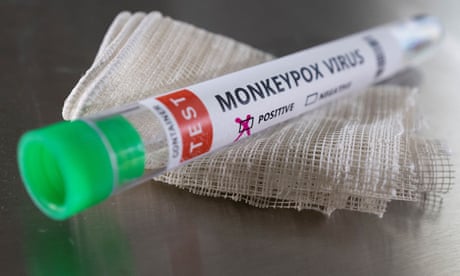- by foxnews
- 08 Apr 2025
Why are Monkeypox cases suddenly emerging across the world and could the virus have mutated?
Why are Monkeypox cases suddenly emerging across the world and could the virus have mutated?
- by theguardian
- 24 May 2022
- in news

The sudden emergence of monkeypox in several countries has raised questions about how the virus, which is most common in central and west Africa, has managed to spread.
Many health experts have said the monkeypox cases in 12 countries are not cause for panic, given the virus is much less infectious than illnesses like Covid and rarely fatal, but it is highly unusual.
First identified in 1970, monkeypox cases usually only occur outside central and west Africa when a traveller becomes infected there and subsequently returns home. These cases do not usually lead to wider outbreaks.
In other rare cases, owners of imported pets become infected, with animals such as rodents believed to be sources of transmission.
But the World Health Organization [WHO] said cases are rising in non-endemic countries, with no link to travel or animals identified in most of these cases.
So what are the main theories about why cases are suddenly emerging this time?
The smallpox vaccine offered the bonus of strong protection against monkeypox. A study published in the journal PLOS Neglected Tropical Diseases in February which warned monkeypox cases were rising also attributed this to the cessation of widespread smallpox vaccination, given that virus has been declared by WHO as eradicated.
In some countries where the virus has been detected, like Australia, mass smallpox vaccination never occurred.
Epidemiologists flagged growing case numbers before WHO issued its alert earlier in May. There were calls for better worldwide surveillance and detection of monkeypox cases prior to the current outbreaks because of data suggesting a resurgence of the disease.
Between 2010 and 2019, cases re-emerged in Liberia and Sierra Leone after a four-decade absence and in Central African Republic after three decades, research published in February and led by Pallas Health Research and Consultancy in The Netherlands found.
Since the Covid-19 pandemic began researchers and health workers worldwide are also more alert to symptoms of viruses and are quicker to report anything unusual, helping to lead to the detection of cases.
Human-to-human spread is not easy for monkeypox; one study found 3% of close contacts of someone with monkeypox will become infected.
But the strange rise in cases has raised the possibility that the virus may have mutated in a way that makes person-to-person transmission more likely.
More data and laboratory analysis is needed to confirm this, however, and for now it is just a theory. Sequencing of the virus in laboratories is occurring, and we should know within days whether the virus has changed.
While monkeypox has been around for decades it is nonetheless considered a rare disease, meaning there is always more to learn about it.
Sores in the mouth can also be infectious.
In the current outbreak, clusters have occurred among men who have sex with men, which has not been the case previously. But experts have warned against declaring it a sexually transmitted disease, or attributing spread to certain communities. It is much more likely that the close contact that occurs during sex is responsible for spread, rather than the disease being sexually transmitted.
In the meantime WHO has urged people not to stigmatise those diagnosed with the virus.
It could be that the virus has not mutated at all, but that it has taken advantage of an ideal opportunity to spread when all the conditions were right; for example, in a community of people in close contact with each other, where there were multiple opportunities for spread.
- by foxnews
- descember 09, 2016
Ancient settlement reveals remains of 1,800-year-old dog, baffling experts: 'Preserved quite well'
Archaeologists have recently unearthed the remarkably well-preserved remains of a dog from ancient Rome, shedding light on the widespread practice of ritual sacrifice in antiquity.
read more


